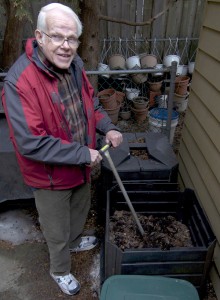Curbside organics recycling pilot promotes curbside composting

BELLEVILLE, Ont. (24/01/12) Gerry Boyce demonstrates how to use the compost bin. Boyce has been composting since 1991, and said that he composts to save money, and prevent the release of methane gas that landfills produce. Photo by Brynn Campbell.
By Brynn Campbell
To be green or not to be, that is the question.
A total of 700 residents are involved in Belleville’s Curbside Organics Recycling Pilot Project. The Curbside Organics Recycling Pilot Project is to help promote curbside composting. The project began Sept. 8 of last year, when each household was given a green bin for compost pick up. After the first three successful months, Belleville City Council passed a motion to continue the project until June, 2012 for further analysis.
“The project will extend till the end of June, 2012,” said Brad Wilson, director of operational and environmental services. “We view it as a great success. The people really like it, whether we take it city wide or to a portion of the city. I think it’s the city’s intention to extend the project.”
The project’s intentions are to reduce kitchen waste from landfills. This would help reduce the amount of methane gas released from landfills, and to help turn composting material into nutrient soil.
“Nearly one third of landfills is compost diverting to compost,” said Wilson. “The disposed organic material needs to go to a compost facility. Each week the compost is picked up from the 700 different residences, and brought to Norterra Organics, in Kingston.
“The biggest portion (of the costs) of the project is the green bins and the kitchen catchers,” said Wilson. “The actual collection doesn’t cost as much.”
Gerald Boyce, an avid composter is all for Belleville’s Organics Recycling Pilot Project. Boyce has been composting since 1991, and Boyce admits that the reason he got into composting was it is cheaper to compost your own food then to have garbage pick up or bring your own waste to a landfill.
“At one point, I had three composts,” said Boyce.
Boyce said he was optimistic about the pilot project and agreed that it would be successful. “ I think the project is working well, so they can extend it, “ said Boyce. “For people in apartments, it certainly would be easier and a lot cheaper.”
A curbside composting system would not only save money for each household, it could also save money on a bigger scale.
“By getting rid of the waste material from the waste stream, it was saving the city and the municipalities around it, money,” said Boyce.
Composting would be more environmentally friendly.
“One of the problems with landfills is the methane gas coming out,” said Boyce.
“Composting is vital; it can be a money saver. Look at all the good things it can do, it looks to be the way of the future. I think you can say that without any fear of contradiction.”
 Print This Post
Print This Post






